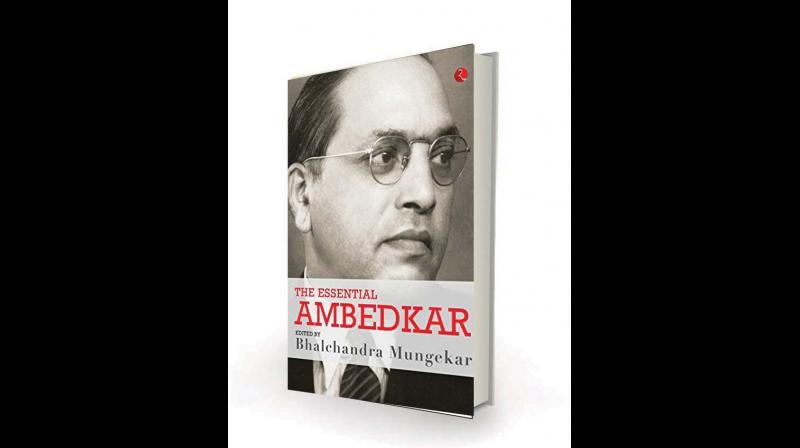Book Review 'The Essential Ambedkar: A rich insight into Ambedkar's mind'
The book includes excerpts from Ambedkar's writings and speeches.

A few weeks ago, Ramchandra Guha, wrote a piece in a national daily which has generated a fair amount of controversy. The piece, titled “Does Gandhi Have A Caste?” suggests that Mahatma Gandhi was such a great individual that caste had hardly had any influence on him, in a personal as well as political sense.
While this may be acceptable to a large section of people, who revere Gandhi as the Mahatma, this view would have found no traction with one of Gandhi’s passionate critics — possibly his greatest ever — B. R. Ambedkar.
The Essential Ambedkar, edited by noted Ambedkar scholar and Rajya Sabha MP Bhalchandra Mungekar makes it abundantly clear, that Ambedkar, the great emancipator of dalits, makes absolutely no bones about his aversion to Gandhi, and his reputation as someone who had the interests of Dalits in his heart.
The book includes excerpts from Ambedkar’s writings and speeches, which showcase his views on several matters: Pakistan, Buddhism, Marxism, the Constitution, and caste, among others. His pronouncements and insights on these subjects remain relevant and worthy of lengthy discussions. However, Ambedkar’s relations with Gandhi and his opinion of the latter’s politics have assumed an important place in the intellectual discourse lately. This makes it specially important to consider the contribution made by the book to this debate.
In the section titled “Gandhi and the Struggle of the Untouchables”, Ambedkar cites four reasons behind his distrust of Gandhi as a messiah of untouchables.
First, he says that Gandhi never made it compulsory for Hindu members of the Congress to employ an untouchable in their homes for carrying out domestic duties. According to Ambedkar, this would have allowed the mitigation of untouchability to a great degree. Second, Ambedkar points out that during the six-year long satyagraha — for which he credits Gandhi as the inventor — dalits carried out in Maharashtra to avail of drinking water from public wells and enter temples, Gandhi was conspicuous by his absence. He did not support it in any way, rather “he condemned it in strong terms”. He also notes that Gandhi never fasted for the eradication of untouchability. Finally, Ambedkar criticises him for the failure of the Poona Pact, which had won dalits of India significant political safeguards after the former took up their cause with the British at the Round table Conference of 1931.
All these are very grave charges and maybe Mr Guha should at least consider them because they disprove his thesis comprehensively. Otherwise, his take on the matter would remain liable to suspicions of whitewashing Gandhi’s reputation.
Ambedkar’s views on Pakistan are not very well-known but the excerpts cited in the book show him to be probably the most objective analyst of the Two-Nation theory, which led to the creation of Pakistan. He believed that Pakistan was in the making right from the time the Congress began its operations and despite occasional collaboration, most importantly during the Khilafat movement, Hindus and Muslims were bound to separate into two nations. In his view, this inevitable political development was best accepted by both nations, and to their benefit — in fact, he supported the Muslims in their demand for self-determination. The chapter on Pakistan also presents his views on Muslims and Islam and they are, it must be said, quite critical in places.
“The brotherhood of Islam is not the universal brotherhood of Islam. It is a brotherhood of Muslims for Muslims only. There is a fraternity but its benefit is confined to those within that corporation. For those who are outside the corporation, there is nothing but contempt and enmity,” he wrote.
He also considered Muslims invaders to be chief architects of the destruction of Buddhism in the country. Citing the historian Surendra Nath Sen, he observes that all the places in India where Muslims grew exponentially were originally centres of Buddhist influence, for example, in Kashmir and Punjab. Never does Ambedkar, who converted to Buddhism later in his life, show a shred of animosity towards Islam for this reason though he considered Buddhism to be the most superior religion of all. This, he said, was because unlike any other religion, Buddhism promoted the universal values of equality, fraternity and liberty, the motto of the French Revolution to which Ambedkar pledged allegiance, among other reasons.
His views on caste and untouchability provide the essence of his thinking on the subject closest to his heart. They show his wide erudition on the issue, combined with shrewd analysis. For example, he did not buy the argument that Hindu civilisation has survived for so long due to some inherent superiority. Instead, a “graded inequality” which characterised caste was responsible for this, as no caste ever dared to rebel in order to preserve whatever privileges they had gained. Moreover, the denial of the right to bear arms also made the oppressed sections incapable of a violent retribution, he wrote.
Ambedkar was a highly original thinker, most probably the greatest India ever produced, and the book presents his views on wide-ranging subjects in a thorough as well as concise manner. A little bit of care could be exercised in the subsequent edition as far as the typographical errors are concerned. There are several of them in critical places and they take away the joy of reading ever so slightly by making the meaning obscure wherever they appear. The structuring of featured excerpts could also be made more precise so all the topics which are inter-connected follow each-other. These are, however, very minor quibbles. The book does not suffer from any major deficiencies and is a welcome addition to the existing corpus of Ambedkarite literature and ideology.

